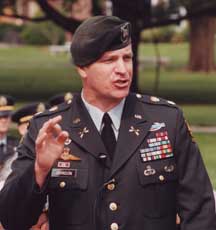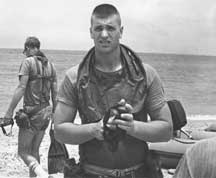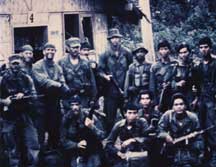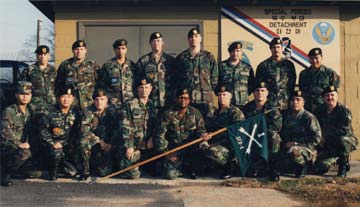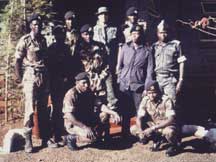Mark Johnson served the nation in an exemplary manner during his twenty year career as an Army officer, retiring October 1, 2000, in the rank of Lieutenant Colonel. Mark received his commission from the ROTC department at Kansas University. He graduated from the Special Forces Qualification Course in 1981, earning the Green Beret. While assigned to the 7th Special Forces Group (Airborne), he deployed to various locations in Asia, the Pacific region, and west Africa, often for long periods of time. He served in a variety of positions, most notable among them A-detachment Commander for Operational Detachment (ODA) A-751 and Special Forces Company Executive Officer. In 1984, President Reagan reactivated the 1st Special Forces Group (Airborne) and Johnson was the first officer selected from a carefully screened, handpicked group of officers to command the first A-team (A-111). During his years on Okinawa, Japan, he deployed to all parts of Asia and the Pacific, often times in remote, isolated areas. Frequent locales included Thailand, Philippines, Korea, Malaysia, Indonesia, Guam, Hawaii, and Japan.
After a one-year remote assignment with the Republic of Korea’s 1st Army headquarters in Wonju, Korea, Mark spent four years with the 5th Special Forces Group (Airborne), which took him to numerous locations in Africa, to include Somalia, the Middle East, and Operations Desert Shield and Desert Storm. During his more than seven months in the Persian Gulf, he served as his battalion’s Operations Officer, responsible for conducting a multitude of special operations missions, to include deep Special Reconnaissance and Direct Action missions, Combat Search and Rescue, and Coalition Support Operations. When his duty in the Gulf War ended, Johnson was chosen to command the Special Forces Detachment-Korea, an elite unit of U.S. and Korean Special Forces senior-level soldiers, in Seoul, Korea for two years. After being selected for and attending the Command and General Staff College, he then became part of the faculty and was responsible for the instruction and education of mid to senior level officers and commanders. He then was summoned to Europe to act as the Special Forces plans and operations officer for a NATO command, the Allied Forces Central Europe, in the Netherlands.
Colonel Johnson closed his military career as he had opened it…by having a significant positive impact on the lives of many people. As the Professor of Military Science at Pittsburg State (KS) University, in his first year he obliterated the existing NATIONAL RECORD for sending students to an ROTC leadership camp in Fort Knox, Ky. Of the more than 300 universities across America who send students to this six-week camp each summer, the previous record for attendance from one school was 25. The average number sent by each university was 3. Pittsburg State had never sent more than 7 in one year, and usually sent 2 or 3 each summer. Johnson recruited, motivated, and sent 52 students to camp, more than doubling the existing national record! This illustrates the sheer magnetism of Johnson’s charismatic leadership, and his leadership message.
|
|||||||||||||
|

